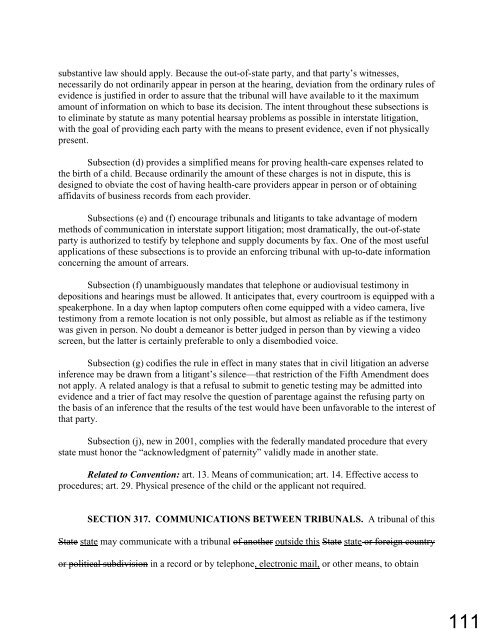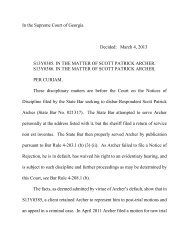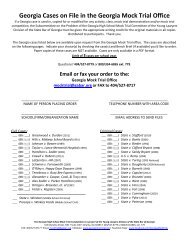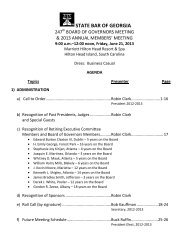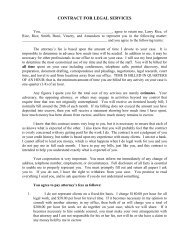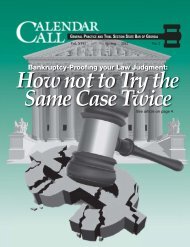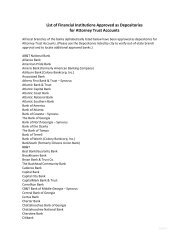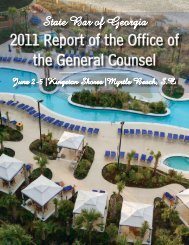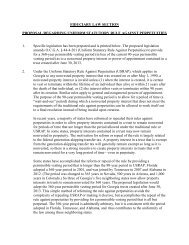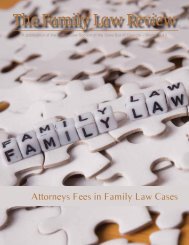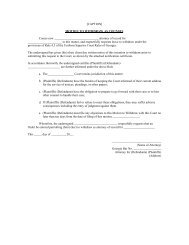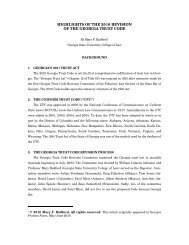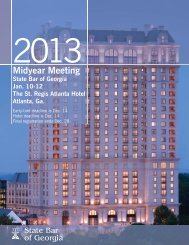2008 Amendments to the Uniform Interstate Family Support Act ...
2008 Amendments to the Uniform Interstate Family Support Act ...
2008 Amendments to the Uniform Interstate Family Support Act ...
You also want an ePaper? Increase the reach of your titles
YUMPU automatically turns print PDFs into web optimized ePapers that Google loves.
substantive law should apply. Because <strong>the</strong> out-of-state party, and that party’s witnesses,<br />
necessarily do not ordinarily appear in person at <strong>the</strong> hearing, deviation from <strong>the</strong> ordinary rules of<br />
evidence is justified in order <strong>to</strong> assure that <strong>the</strong> tribunal will have available <strong>to</strong> it <strong>the</strong> maximum<br />
amount of information on which <strong>to</strong> base its decision. The intent throughout <strong>the</strong>se subsections is<br />
<strong>to</strong> eliminate by statute as many potential hearsay problems as possible in interstate litigation,<br />
with <strong>the</strong> goal of providing each party with <strong>the</strong> means <strong>to</strong> present evidence, even if not physically<br />
present.<br />
Subsection (d) provides a simplified means for proving health-care expenses related <strong>to</strong><br />
<strong>the</strong> birth of a child. Because ordinarily <strong>the</strong> amount of <strong>the</strong>se charges is not in dispute, this is<br />
designed <strong>to</strong> obviate <strong>the</strong> cost of having health-care providers appear in person or of obtaining<br />
affidavits of business records from each provider.<br />
Subsections (e) and (f) encourage tribunals and litigants <strong>to</strong> take advantage of modern<br />
methods of communication in interstate support litigation; most dramatically, <strong>the</strong> out-of-state<br />
party is authorized <strong>to</strong> testify by telephone and supply documents by fax. One of <strong>the</strong> most useful<br />
applications of <strong>the</strong>se subsections is <strong>to</strong> provide an enforcing tribunal with up-<strong>to</strong>-date information<br />
concerning <strong>the</strong> amount of arrears.<br />
Subsection (f) unambiguously mandates that telephone or audiovisual testimony in<br />
depositions and hearings must be allowed. It anticipates that, every courtroom is equipped with a<br />
speakerphone. In a day when lap<strong>to</strong>p computers often come equipped with a video camera, live<br />
testimony from a remote location is not only possible, but almost as reliable as if <strong>the</strong> testimony<br />
was given in person. No doubt a demeanor is better judged in person than by viewing a video<br />
screen, but <strong>the</strong> latter is certainly preferable <strong>to</strong> only a disembodied voice.<br />
Subsection (g) codifies <strong>the</strong> rule in effect in many states that in civil litigation an adverse<br />
inference may be drawn from a litigant’s silence—that restriction of <strong>the</strong> Fifth Amendment does<br />
not apply. A related analogy is that a refusal <strong>to</strong> submit <strong>to</strong> genetic testing may be admitted in<strong>to</strong><br />
evidence and a trier of fact may resolve <strong>the</strong> question of parentage against <strong>the</strong> refusing party on<br />
<strong>the</strong> basis of an inference that <strong>the</strong> results of <strong>the</strong> test would have been unfavorable <strong>to</strong> <strong>the</strong> interest of<br />
that party.<br />
Subsection (j), new in 2001, complies with <strong>the</strong> federally mandated procedure that every<br />
state must honor <strong>the</strong> “acknowledgment of paternity” validly made in ano<strong>the</strong>r state.<br />
Related <strong>to</strong> Convention: art. 13. Means of communication; art. 14. Effective access <strong>to</strong><br />
procedures; art. 29. Physical presence of <strong>the</strong> child or <strong>the</strong> applicant not required.<br />
SECTION 317. COMMUNICATIONS BETWEEN TRIBUNALS. A tribunal of this<br />
State state may communicate with a tribunal of ano<strong>the</strong>r outside this State state or foreign country<br />
or political subdivision in a record or by telephone, electronic mail, or o<strong>the</strong>r means, <strong>to</strong> obtain<br />
111


